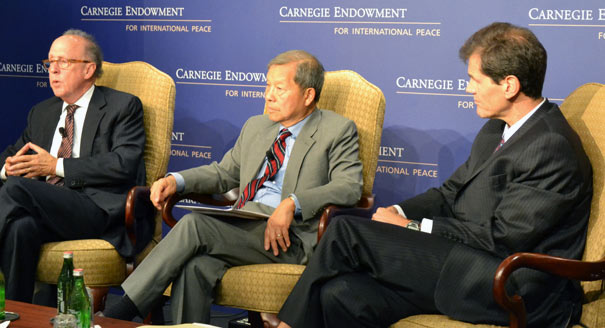Registration
Thank you!
You will receive an email confirming your registration.
IMGXYZ3945IMGZYXThere is increasing concern that China’s economic slowdown is intensifying. Some have speculated about a collapse while others acknowledge the risks, but see prospects for a “soft landing.” This slowdown is occurring just as the next generation of Chinese leaders is being anointed. Yale School of Management’s Stephen Roach and the IMF’s Markus Rodlauer discussed China’s economic prospects and policy options for the coming year. Carnegie’s Yukon Huang moderated.
The Current State of the Chinese Economy
Rodlauer introduced the major findings of the International Monetary Fund on the state of China’s economy.
- Explaining Low Growth Rates: Rodlauer reported that low growth rates in China are a result of both a policy-induced slowdown and a decline in external demand, as struggling Western economies have cut back on imports. The IMF sees a moderate recovery in growth into next year and predicts the Chinese economy will achieve a measured soft landing. Roach agreed that the Chinese economy is near its lowest growth rates, and barring another external shock, the economy will begin to recover.
- Internal Imbalances: Rodlauer raised concerns about internal imbalances in the Chinese economy, even as the country’s current account surplus has moderated. He argued that the high investment to GDP ratio, about 50 percent, is unsustainable. Roach drew a distinction between the rate of growth in investment and the actual levels of capital stock in the country. The investment rate is so high, he said, because the country is rebuilding extremely low capital stocks from the post-Cultural Revolution era.
- Capital Stock per Worker: Roach noted that China’s level of capital stock per worker is less than ten percent of that in Japan, and argued that China could run high investment rates for several years as it continues to develop its economy and advance urbanization.
- Service Sector Development: Roach added that a growing urban population and rising wages would likely spur the development of China’s services sector, and called for further development of the social safety net to encourage consumption.
China and the West
- Western Fears: Roach argued that the Western fear of a collapse of the Chinese economy stems from a fundamental misunderstanding of China’s economy. It demonstrates that the West thinks that the Chinese economy is similar to Western economies, an incorrect assumption that leads to distorted and biased analyses of China, he said.
- Western Role: Roach highlighted the role of the U.S. savings deficit in creating China’s bilateral trade surplus. Borrowing foreign capital to finance consumption helped create China’s external balances, he said. Without addressing the U.S. deficit, currency appreciation or other measures would just move production out of China and into other countries without solving the underlying imbalances.
- Western Opportunities: Chinese growth is also an opportunity for the United States, Roach added, noting that China is the third-largest and fastest-growing U.S. export market. He chastised both U.S. presidential candidates for their anti-China rhetoric and urged policymakers to rethink the U.S. approach to China.
Trade Imbalances
- Growth Estimates: The IMF estimates that as the global economic climate improves, the trade surplus could increase again to around four to five percent of GDP in the absence of further policy actions. Rodlauer said that such a level was still too high.
- Currency Valuation: The IMF now believes that Chinese currency is “moderately” undervalued, Rodlauer added. He recommended gradual currency appreciation accompanied by structural reforms.
Future Challenges
- Corruption: The issue of corruption is important to solve, panelists agreed. Rodlauer recommended moving from an inefficient system of resource allocation by state-owned banks to a more transparent, market-driven process. Huang added that corruption is largely seen in China as a local problem, and called for more accountability and direct elections by local government.
- External Factors: External factors like the U.S. “fiscal cliff,” a eurozone meltdown, or an oil shock could derail China’s economic recovery, Rodlauer said.
- Domestic Reforms: Rodlauer highlighted the need to boost household income and consumption, strengthen the social safety net, and undertake hukou residency reforms.
- Avoid Low Quality Growth: Rapid credit growth and an investment boom encouraged by artificially low input prices could create distortions and incentivize low-quality growth, Rodlauer added. The IMF recommended that investment growth should be stabilized and brought down to a lower rate. Huang suggested developing the service sector, especially given the 200 million college-educated workers in the Chinese workforce will be seeking skilled jobs that pay higher wages.
- Leadership Transition: The upcoming leadership transition, however opaque it appears to outsiders, should not disrupt the continuity of economic development, panelists agreed. Roach singled out outgoing premier Wen Jiabao for championing needed economic and political reforms.
